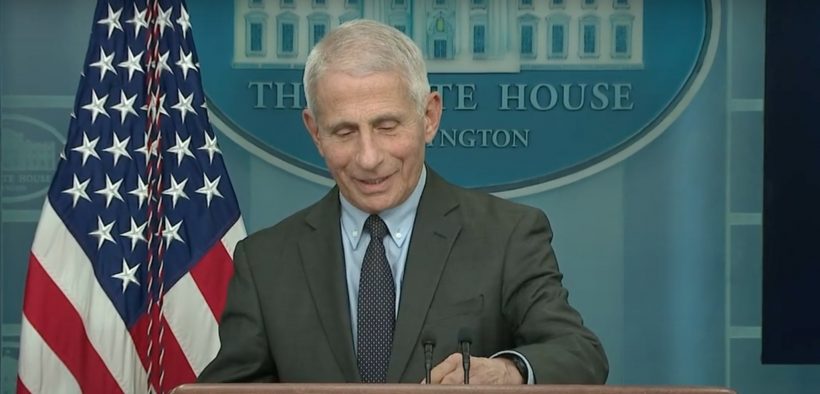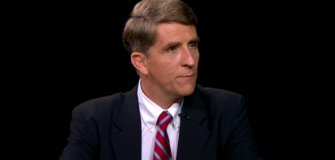The Final, Never-Ending, Officious, Self-Puffing Farewell Tour of Dr. Anthony Fauci
Share

Nobody thought it was going to be a humble shuffling off into anonymity.
And I suppose we cannot begrudge the most celebrated bureaucrat in the U.S. government a final retracing of his much-trodden path through the green rooms of New York and Washington, D.C.
But still …
This is like Kobe or Kareem or Dr. J, basking in encomiums in going-away ceremonies at every NBA stop in his final season. Or like Elton John, who has more farewell performances under his belt than he has hits. Or like — we’re going right to the top here — Cher, whose first farewell “tour,” the first of three, her Never Can Say Goodbye Tour, lasted three years and went for 325 shows.
But then again, why would he apologize when a sycophantic press corps largely agrees with his shutdown mentality and has been plumping his exploits for going on three years?
Dr. Anthony Fauci is a lot more famous than Cher. Indeed, he’s right up there in the fame game with Kate Middleton. There are Fauci votive candles, Fauci bobbleheads, Fauci Christmas tree ornaments, Fauci coffee mugs, Fauci oven mitts, a #trustFauci Twitter hashtag. If COVID had a face, it would be his.
After seeing him every day during the annus horribilis of 2020, and almost as frequently in the time since, when the world’s most famous virologist announced in August that he was hanging up his lab coat at the end of the year, some of us marked our calendars and thought, with an end date established, the doctor would ease off the stage all respectable-like, as do his more faceless peers in other bureaucracies when they retire.
We should have known better. The man, after all, is science. “If you are trying to get at me as a public health official and a scientist, you’re really attacking, not only Dr. Anthony Fauci, you’re attacking science,” he said in 2021. And science is not going to exit the stage with a mere curtain call or two.
Journalists, en masse, have pounded a path to his door, seeking one last warning, a valedictory pronunciamento, one final exhortation to keep your masks handy, get another jab, and “follow the science.” Fauci has been their go-to source on all things COVID for almost three years now. He had, from January 2020 to June 2021, according to Forbes, “participated in 354 television, radio, podcast, and online interviews, including lectures, panel discussions, speeches, and press conferences”; he was a man who, in the words of the Washington Post, “seems to transcend time and space, appearing in all media at all times.” Which is pretty good for somebody whose job is not even in PR.
On his way out the door, so to speak, he made 17 appearances or interviews in September and 15 in October— most of them soft-toss sit-downs with suitably prostrated journos. I couldn’t find a list for November, but on Dec. 1 the camera-chasing epidemiologist conducted a farewell interview with the Wall Street Journal, putatively his seventh and final time sitting with Journal reporters on their podcast, in which he had the opportunity to address whether he would do anything differently if given the chance.
Here’s a partial transcript:
Kate Linebaugh: And looking back, do you think that there are some things you would have done differently knowing what you know today with regard to the political divisiveness?
Anthony Fauci: Well, there’s nothing I can do about political divisiveness. I guess you’d have to be much more sensitive in your description of things, knowing that there will be, in some cases, deliberate distortion of what you say and just be aware that that’s the case. You have to be really careful of anything you say, particularly myself, being a very visible figure. I mean, the amount of distortion related to things that we say that are really common-sense public health issues is really rather striking and unfortunate because it [is] counterproductive to good public health practices.
Kate Linebaugh: How do you think you contributed to that divisiveness?
Anthony Fauci: Excuse me, but where are we going with this conversation? What do you mean how I contributed to this? I mean, come on, let’s open it up. Where are we going with the conversation?
Kate Linebaugh: We’re looking back at what happened. I mean, I’m just sort of looking back at this pandemic, and your role, and there are lots of people who point a finger at you and they have their concerns, and so I’m just asking whether you feel that there’s anything you would’ve done differently.
Anthony Fauci: Well, everything that I’ve done from the very beginning is to try and help. One of the issues that we’re faced with this outbreak is that particularly in the early months and the first year, it was a moving target. And if we knew in January what we knew in June or July, we may have taken a different approach. But that’s the nature that science is self-correcting. You act on the data as you have it at a given time, and if the data change, you may have to change your stance, and that is sometimes interpreted as being flip-flopping, but it isn’t. It’s trying to stay in line with what the data and the scientific evidence are showing you.
I take that as a no.
Which is all the more incredible when one thinks of how much he could take accountability for. Let’s check the record.
On masks, he’s been all over the place. A month after the outbreak, he said masks were no good — too porous to keep the germs out. Later, he was all-in on face coverings, and not only one but two. “If you have a physical covering with one layer, you put another layer on, it just makes common sense that it likely would be more effective.” Masks, we now know, don’t keep the uninfected from becoming infected. However, if on any count he is granted a mulligan, it would be on masks, because in the early days some decisions had to be made on the fly, based on incomplete knowledge.
But the rest of the report card is not so good. Fauci dissed natural immunity in favor of vaccine mandates when common sense, let alone history, shows the former far better at negating, or minimizing, the effects of the virus. Fauci’s vaccine edicts caused many COVID-recovered hospital employees — not to mention military, and others— to lose their jobs.
Closing schools was one of the most destructive of his emphases. Even if kids get COVID, the chances of them dying from it are minuscule. Wrote Martin Kulldorff and Jayanta Bhattacharya in Newsweek,
Throughout the 2020 spring wave, Sweden kept daycare and schools open for all its 1.8 million children ages 1 to 15, with no masks, testing or social distancing. The result? Zero COVID deaths among children and a COVID risk to teachers lower than the average of other professions. In fall 2020, most European countries followed suit, with similar results. Considering the devastating effects of school closures on children, Dr. Fauci’s advocacy for school closures may be the single biggest mistake of his career.
Fauci supported school closures before he didn’t support school closures and, after that, said he never did support school closures. And after closing schools proved devastating to children, he downplayed its effect: “I don’t think it’s forever irreparably damaged anyone.” Closing schools was one of the biggest catastrophes of the COVID years; the learning deficit imposed by government on kids by denial of in-person learning will linger for many years. David Leonhardt wrote in the New York Times: “Children fell far behind in school during the first year of the pandemic and have not caught up.” Michael Petrilli, president of the Thomas B. Fordham Institute, said: “This is a disaster.… We haven’t seen this kind of academic achievement crisis in living memory.”
But surpassing all in destruction is one thing: the lockdown. Fauci’s advice locked down this country, in what will be known as one of the worst moves of the 21st century. He says he didn’t do that either, but, again, he did, to wit: “When it became clear that we had community spread in the country … I recommended to the President that we shut the country down.”
And then there’s “gain of function” and social distancing and contact tracing and holiday restrictions and not wearing a mask when insisting everybody else does, to mention a few other things.
He could apologize for any or all of the government’s catastrophic COVID policy, but he hasn’t. He is proud and defiant right to the end. That too will be part of his legacy.
But then again, why would he apologize when a sycophantic press corps largely agrees with his shutdown mentality and has been plumping his exploits for going on three years? And they, after all, will likely provide him his best opportunity to keep his face in public view. They’re probably warming up a host seat at MSNBC or CNN for him as we speak.
The seat he should be sitting in, though, is in front of a congressional tribunal.













